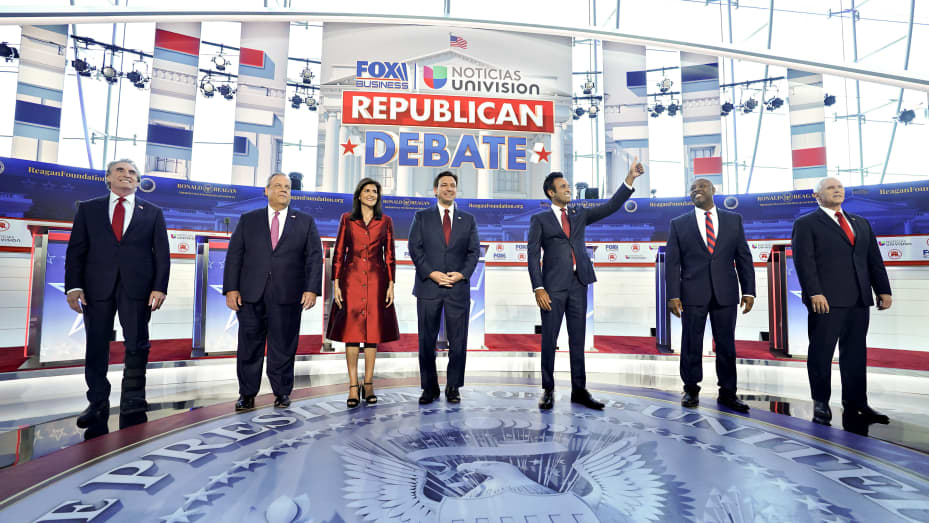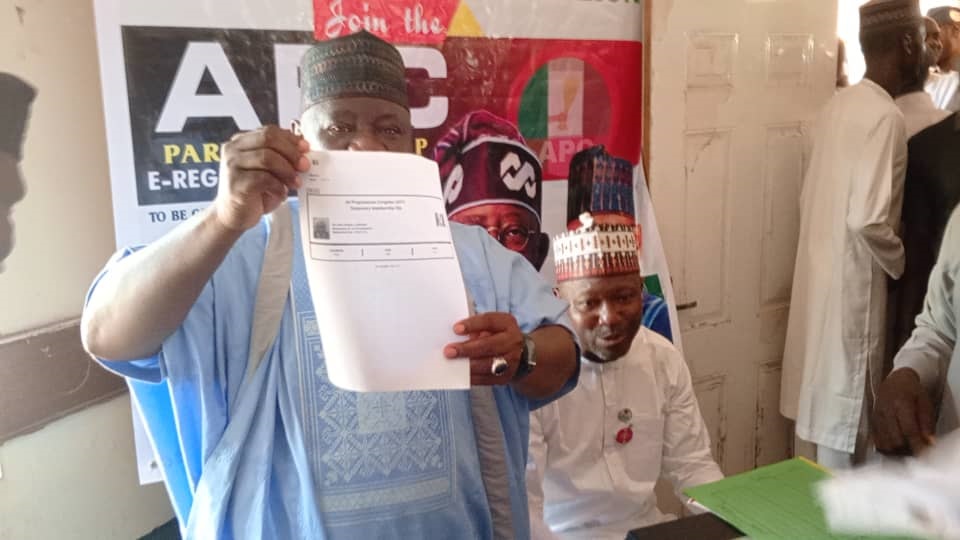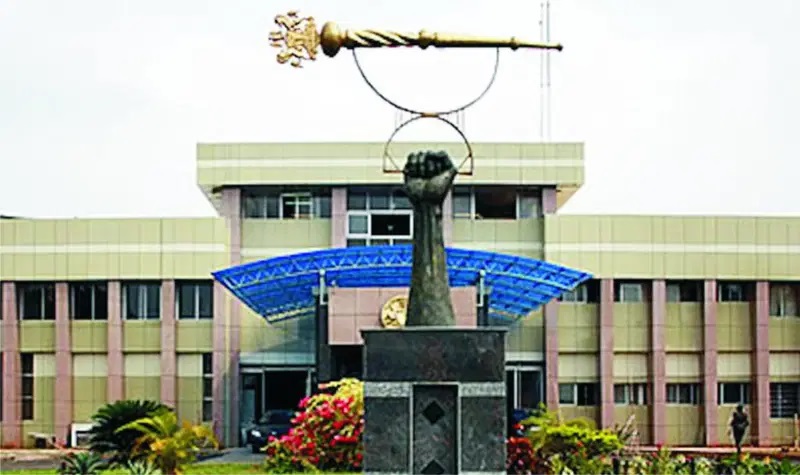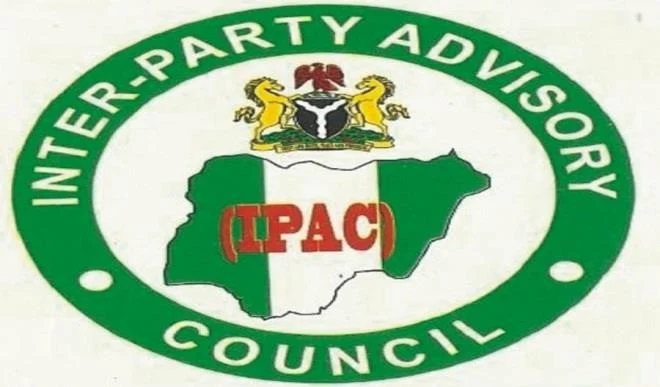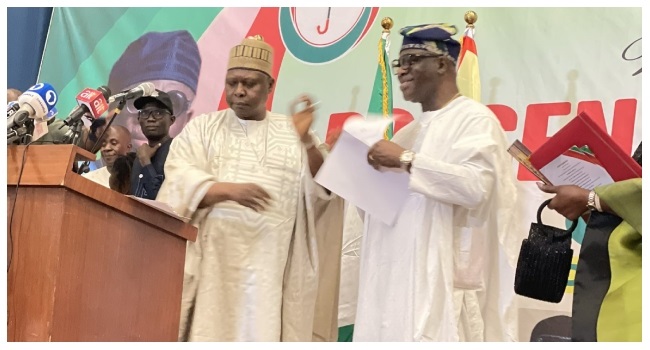Explore the highlights of the second 2024 Republican presidential primary debate, featuring former President Donald Trump’s absence and memorable exchanges among GOP contenders. Learn how Trump’s safe approach seems to pay off and how candidates tackled issues like immigration, healthcare, and abortion.
The second 2024 Republican presidential primary debate unfolded in a manner that echoed its commencement – with former President Donald Trump, yet to share the debate stage with his rivals, firmly established as the frontrunner of the Republican Party.

At the Ronald Reagan Presidential Library in California, seven GOP contenders convened for a showdown that delivered several memorable moments. Former South Carolina Gov. Nikki Haley, in particular, seized the spotlight by venting what appeared to be a collective frustration with entrepreneur Vivek Ramaswamy. She didn’t mince words, telling him, “Honestly, every time I hear you, I feel a little bit dumber for what you say.”
Trump’s conspicuous absence did not go unnoticed. Florida Gov. Ron DeSantis remarked that he was “missing in action,” while former New Jersey Gov. Chris Christie took a humorous jab, referring to the former president as “Donald Duck” and alleging that he “hides behind his golf clubs” instead of defending his record on stage.
The GOP field also aimed their critiques at President Joe Biden. South Carolina Sen. Tim Scott chastised Biden for not visiting striking auto workers but instead advocated for his presence at the southern border. Former Vice President Mike Pence asserted that Biden should be “on the unemployment line,” and North Dakota Gov. Doug Burgum accused Biden of interfering with “free markets.”
Despite these exchanges, it appears that this debate is unlikely to shift the trajectory of a GOP race where Trump has consistently maintained a dominant position in both national and early-state polls.
Key Takeaways from the Second GOP Primary Debate
Trump’s Safe Approach Pays Off
Donald Trump opted for a safe strategy by skipping the debates and adopting the stance of an incumbent in the 2024 GOP primary. It remains unclear whether his absence will significantly impact his standing among party voters, given the largely positive views of his presidency held by many.
While Trump’s rivals did take some shots at him, such as DeSantis critiquing his deficit spending and Christie’s humorous jabs, the former president managed to largely evade in-depth scrutiny of his four-year tenure in the Oval Office. Trump campaign senior adviser Chris LaCivita dismissed the debate as “boring and inconsequential,” indicating that it is unlikely to reshape the primary contest dynamics.
A Messy Two Hours
The second GOP primary debate was marred by interruptions, crosstalk, and prolonged disputes between candidates and moderators over speaking time. This chaotic atmosphere made it challenging for viewers to follow the proceedings and for candidates to distinguish themselves as viable alternatives to the absent Trump.
Interestingly, some of the highest-polling candidates after Trump, namely DeSantis and Haley, were among the least willing to engage in the early-hour commotion. Moderators attempted to clear the way for DeSantis, but he remained conspicuously absent from the discussion during the crucial initial 15 minutes. Ramaswamy, on the other hand, managed to make his voice heard amidst the chaos, although he often found himself caught between his own talking points and criticism from frustrated candidates like Scott.
While the moderators may receive criticism for losing control of the debate, the messy proceedings still offered voters valuable insights into the participating candidates.
Palmetto Pummeling
Throughout the night, Tim Scott appeared eager for confrontation, and he eventually found it when he targeted fellow South Carolinian Nikki Haley. The exchange began with Scott accusing Haley of spending $50,000 on curtains during her tenure as the US ambassador to the United Nations. What followed was a spirited back-and-forth about the curtains, with both candidates exchanging barbs.
While their exchange was not the most acrimonious moment of the night, it highlighted the deepening divide between the two South Carolina natives. It’s worth noting that about a decade ago, when Haley was governor, she appointed Scott to the Senate seat he currently holds, but their confidence in each other appears to have waned in the context of the presidential race.
An Uneven Performance for DeSantis
Facing his Republican competitors for the first time in earnest, DeSantis delivered a mixed performance from the center of the stage. This spot, previously secure, seemed less so heading into this debate.
DeSantis faced tough questions on his record, including criticism from Pence regarding a jury’s decision to award a life sentence, rather than the death penalty, to a mass murderer in a Florida high school shooting. DeSantis struggled to respond when accused of inflating Florida’s budget by 30% during his tenure. Additionally, Haley pointed out that he took steps to block fracking in Florida on his second day in office.
Despite a rocky start, DeSantis ended the debate on a strong note, emphasizing the importance of voters in electing presidents. However, his late entry into the debate may have limited his impact on the viewership.

Tough Questions on Immigration and Latino Voters
In the debate’s final minutes, co-host Ilia Calderón of Univision posed a question about reaching out to Latino voters who may perceive the Republican Party as hostile or indifferent. Pence highlighted the 2017 tax reform bill and low unemployment rates for Hispanic Americans during the Trump-Pence administration as indicators of the party’s inclusiveness.
Scott emphasized the importance of leading by example and cited his hiring of the only Hispanic female chief of staff in the Senate as evidence of his commitment to diversity.
Calderón also pressed candidates on immigration and gun violence policies. While some candidates struggled to provide direct responses, Pence discussed his efforts to secure the border during his time in Congress. The candidates generally shied away from extensive discussions on abortion, a notable omission in the debate.
Candidates Pile on Ramaswamy
Some candidates on stage were determined not to let Ramaswamy replicate his standout performance from the first debate. Early in the proceedings, Tim Scott challenged the tech entrepreneur on his business record, alleging ties to the Chinese Communist Party and money going to Hunter Biden.
Pence also took a swipe at Ramaswamy, expressing relief that he had withdrawn from a business deal in China. Additionally, Haley criticized Ramaswamy, asserting that every time she heard him, she felt a bit dumber and couldn’t trust him.
DeSantis and Pence Dodge Health Care Questions
When questioned about their records on health care, both DeSantis and Pence struggled to provide clear responses. Pence sidestepped a query about the failure to repeal the Affordable Care Act (Obamacare), and DeSantis deflected attention to Florida’s population growth and low welfare benefits.
In contrast, Nikki Haley actively engaged in the discussion, advocating for transparency in healthcare prices and reforms in lawsuit rules to reduce the power of insurance companies and providers.

The second 2024 Republican presidential primary debate provided viewers with a glimpse of the candidates’ positions, their ability to handle tough questions, and the dynamics of the GOP race. While Trump’s absence remained a dominant theme, the candidates grappled with a range of issues, from immigration and healthcare to personal clashes. As the primary season unfolds, it will be intriguing to see how these debates shape the course of the Republican nomination.

